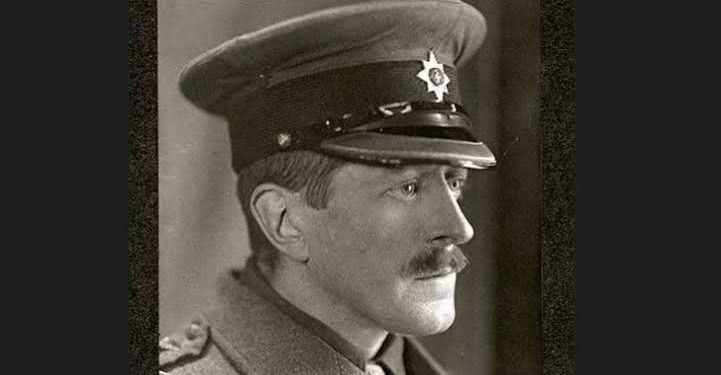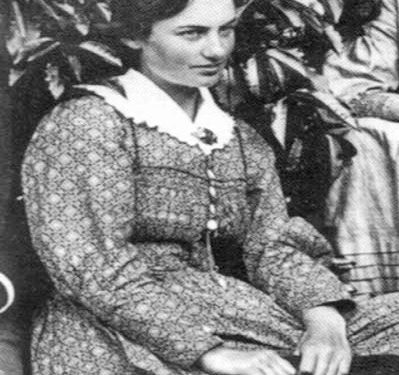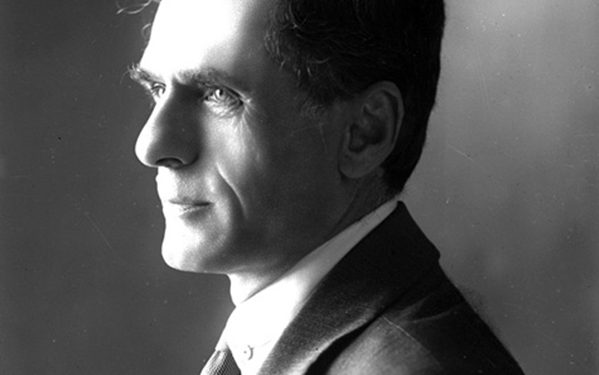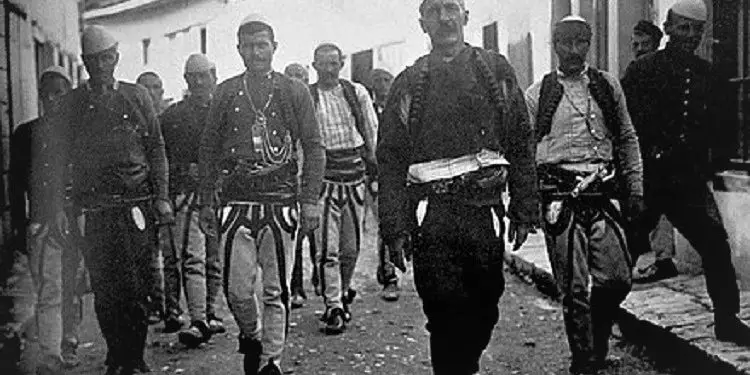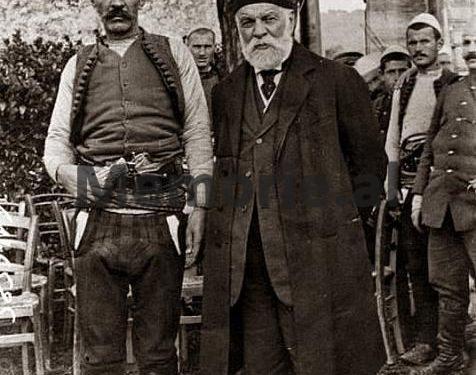By Zylyftar Hoxha
Memorie.al / Although many diplomats and Albanologists, foreign friends and well-wishers have made an extraordinary, incomparable contribution to Albania, first Colonel Aubrey Herbert, with his invaluable assistance to our delegation in London, in the years 1913-1914 and in other Albanian issues, and then, after his death, his mother Ledi Carnarvon, who, as a prominent missionary of world level, assisted and helped the Kosovar emigrants who came to Albania during the years 1923-1929, financed hospitals and health centers with her own funds, opened a large cultural center with a rich library in Tirana, unfortunately today they have almost been forgotten by Albanians.
The village with 50 Kosovar houses that Countess Carnarvon built in Kavajë and that she named after her son, Herbert, apparently did not withstand time, and is now called Qerret; the cultural center and library “Carnarvon”, in the former building of the cinema “Agimit”, was looted and destroyed during the war, and now, recently, has been transformed into a “construction site” for the next skyscraper; two streets, “Carnarvon” Street and “Herbert” Street, have been renamed twice, first with “Punëtorët e Rilindjes” and then with the name “George Bush” Street.
The only recognition for the noble Herbert-Carnarvon family is the highest decoration of the time, “Grand Officer of the Order of Skanderbeg”, granted by Royal decree on May 12, 1929, and nothing else after that. There is something new that draws attention, but this is from the English side: not many years ago the English Parliament published the book “The greatest friend of Albanians, Sir Aubrey Herbert” (Albania’s Greatest Friend) which contains notes, diaries, articles by Herbert, a very interesting book in many ways that has also been translated into Albanian.
Who is Aubrey Herbert?
Sir Aubrey Herbert (1880-1923) was of English aristocratic descent, with over 15,000 hectares of land, a background that did not prevent him from becoming a famous man, active in the political life of the country and the world. He began his career as a diplomat and continued to serve as a military officer in the Irish Guards, and later served for 12 years, a member of the British Parliament from the ranks of the Conservative Party.
In 1904, Herbert began the work of honorary attaché in Istanbul and from this moment until his death (1923), he did not leave his activity for the promotion of Albanian nationalism. Herbert was also important in British life. His figure entered literary eternity, through the character of Sandy Arbuthnot, in the Greenmantle series of novels by author John Buchanan. Aubrey Herbert, diplomat, traveler, intelligence officer, scholar, polyglot, politician – friend of the Albanians, was twice offered the throne of Albania, but political conjunctures made him not accept them.
He became a passionate promoter of Albanian independence, after visiting the country for the first time in 1907. During his stay in Tirana, he became a friend of Esad Pasha. When the Albanian delegates went to the London Conference of 1912-1913, they found Herbert’s help as an advisor. One of the people with whom Aubrey Herbert maintained constant contact was the Albanologist Edith Durham. Herbert had founded a philo-Albanian society in 1912, with parliamentarians, scholars, and journalists, to contribute to the independence of Albania.
Sir Herbert died at the age of 43, in 1923, and his mission in Albania was continued by Countess Carnarvon. In memory of her son, she organized the Albanian-British Committee to help refugees from Kosovo, who sheltered them in the village near Kavaja, which was named Herbert, (today Qerret), as well as several villages in Myzeqe, which are still inhabited today by Kosovar and Serb-Bosnian residents. They opened a school there, fought malaria, set up ambulances with free treatment and medicines, etc. Aubrey Herbert was also a poet.
In 1926, Mit’hat Frashëri wrote about the contribution of the English aristocratic family in Albania: “Gratitude is not only a quality that nourishes, adds to a person’s virtue, but it is also a duty. There are people whose deeds and help are worth an entire army. So, it was for us Albanians, the late Aubrey Herbert”!
As has happened with others, but more so with Herbert, a great injustice has been done, leaving him in oblivion a man who during the birth of the new Albanian state, in 1912, had worked so hard that the imagination of most Albanians today cannot grasp it. The name and works of Albania’s greatest friend are worth more than a monument, more than an institution or street name, above all, historical gratitude.
Friend of prominent Albanians
Herbert was one of the closest and most sincere friends of Albanians and especially of prominent figures of our nation, such as; Ismail Qemali, Mithat Frashëri, Dhimitër Berati, Pandeli Vangjeli, King Zog, Hasan Prishtina, Isa Boletini, Mehmet Konica, Faik Konica, Charles Telford Erikson, etc.
Until his death, he worked tirelessly for the Albanian issue and for its acceptance in British political and diplomatic circles, where an adequate solution was sought. Albania and the Albanians have never had a greater friend than Aubrey Herbert. Although from a wealthy background, he was humble towards the Albanians.
The house of Colonel Aubrey Herbert is still preserved today as it was at the time when he passed away in 1923. In Herbert’s house, where Isa Boletini stayed for days, there are still photographs, costumes and relics related to his connections with the Albanian people.
“Speak well of Albania”!
The connection with Albania was casual, but strong and lasting until death. Qazim Kukeli, an Albanian from Dibra, was the servant at the British embassy in Istanbul. Qazim is the reason that Herbert entered the complicated Albanian world, from the first day they met. Qazim Kukeli, as described by Aubrey Herbert, was an imposing man in all respects, whose companion is difficult to find even in the most epic Hollywood films. In Herbert’s diary, Qazim occupies an important place.
Qazim would accompany his English “master” throughout his stay in Istanbul, his travels in the Balkans, in other countries, and even in Great Britain. Qazim Kukeli was a great help in all aspects of Herbert’s daily life. Marveled at this, Herbert one day asked Qazim what he could do for him in return. Nothing for me. Speak well of Albania when the opportunity arises, Qazim Kukeli had replied. And Herbert did this work, lobbying for Albania throughout his life.
Herbert’s activity for our country
To defend the Albanian cause, Herbert established a committee in London, whose purpose was to influence the Great Powers at the Conference of Ambassadors, to be held in London. From the beginning of the work, it included 12 members of the British Parliament, two senior government officials, the President of the Constitutional Court, the Chief Rabbinate and many other dignitaries. The work on the creation and establishment of the borders of Albania would have gone even worse, if it had not been for the influence of the Committee headed by Aubrey Herbert.
The Committee was the host and organizer of the Albanian delegation that came to London in January 1913, consisting of Mehmet Bey Konica, Rashit Bey Dino and Filip Noga. Since the Albanian government was not yet internationally recognized, the assistance provided by Herbert and the Committee to the delegation was great.
Incomparable assistance was also provided during the work of the Conference of Ambassadors, when the delegation of the provisional government of Albania arrived in London (April 29, 1913). The delegation was headed by Ismail Bey Qemali and was accompanied by Isa Bey Boletini, whom the British press and public knew as the leader of the Albanian guerrillas of Kosovo, who had assumed the function of commander of the Albanian National Militia in the Vlora Government.
Aubrey Herbert on the Albanians
“The Albanians have always been and are ardent devotees of their soil and rocks, and their way of life was built upon them. It was a hard system, but it suited the people; every man was his own capable policeman, and revenge was their accepted code. What Europe would have called revenge, they called justice.
From the point of view of civilized countries, Albania was a lawless country, but the lowest crimes that stain the chronicles of the criminal courts of Western Europe were rare. Much could be said about the Albanian Code. Although there were no railways, the chivalry of the Middle Ages continued to exist.”
The Carnarvon Library: A Precious English Gift to Albanians
Where the Ali Demi Cinema once stood and where a building of today’s grandeur has left no trace of its past, there was the Carnarvon Library, built in 1928 and inaugurated in 1929, as a gift from the family of the English Lords (Earls) Herbert and personally from the great philo-Albanian benefactor, Countess Carnarvon, called by the Albanians themselves the “Mother of the Albanians” and decorated with the Order of “Skënderbe” in 1929.
This library was dedicated to the son, the great friend of Albania, the lawyer and defender of the rights of Albanians, Sir Aubrey Herbert (1880-1923). The library reached a collection of 5,000 books, in English, French, German, Italian, classical languages, etc., and became the second most important library in Tirana, after the National Library. The library had a large reading room, 26 shelves for books with 7 shelves each.
In the room there was also a fireplace with the portrait of Aubrey Herbert, carved in stone. Countess Carnarvon had chosen this place under the dense crown of olive trees, as a cult in memory of her son, but unfortunately, she passed away a few days before the inauguration. Memorie.al





